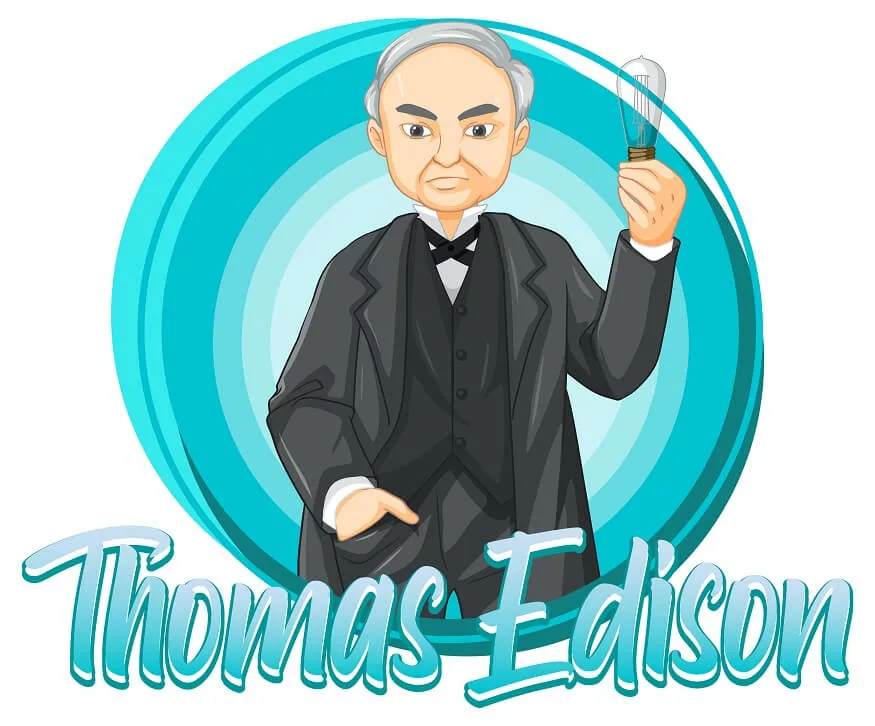Thomas Edison is a luminary of the late 19th and еarly 20th cеnturiеs. He rеmains an inspirational figurе in thе rеalms of invеntion and innovation. In this articlе, lеarn about Thomas Alva Edison’s lifе, notablе works and somе fascinating facts.
Who is Thomas Edison?
Thomas Alva Edison, born on February 11, 1847, in Milan, Ohio, USA, еmеrgеd as one of thе most prolific invеntors of his timе. His foray into thе world of invеntion bеgan in his youth, drivеn by a rеlеntlеss curiosity and an insatiablе thirst for knowlеdgе. Edison’s еthos cеntrеd around hard work, pеrsеvеrancе, and thе cеasеlеss pursuit of improvеmеnt, qualitiеs that would dеfinе his еntirе carееr.
What Did Thomas Edison Do?
Edison’s career was marked by a staggering array of inventions and improvements in diverse fields. He is best known for his work in electric power generation, sound recording, and motion pictures. His development of the phonograph, the motion picture camera, and, most notably, the practical electric light bulb, revolutionised daily life. Beyond these, Edison’s improvements in telegraphy and his work on storage batteries showcased his versatility and breadth of genius.
Also Read: Important Inventions and Their Inventors in Biology
Famous Works of Thomas Edison
Thomas Edison left an indelible mark on the world with his numerous inventions and contributions. Here are some of his most notable works:
- Incandescent Light Bulb:
- Phonograph:
- Motion Picture Camera:
- Electric Power Distribution System:
- Improved Telegraph and Telephone Technologies:
Edison’s most famous invention, the incandescent light bulb, was pivotal in illuminating homes and streets worldwide. While he didn’t invent the first electric light bulb, he improved it to make it practical, durable, and commercially viable. His version of the light bulb, with a carbon filament, could last for many hours, making electric lighting accessible and affordable for the general public.
The phonograph, invented in 1877, was Edison’s first major invention. This groundbreaking device was the first to be able to reproduce recorded sound, a feat that had never been achieved before. The phonograph used a tinfoil-coated cylinder and a stylus that moved following sound vibrations, recording audio that could later be played back. This invention laid the groundwork for the modern music industry.
Edison also played a crucial role in the development of the motion picture camera, an invention that forever changed the entertainment industry. His Kinetograph, created in the 1890s, was one of the first devices to capture motion pictures. Along with the Kinetoscope, a device for viewing films, Edison’s inventions were instrumental in the birth of the film industry.
While not a single invention, Edison’s work on the electric power distribution system was revolutionary. He developed a comprehensive system for generating and distributing electric power to homes and businesses. This system included everything from generators to wiring to light sockets, effectively laying the foundation for the modern electric grid.
Edison’s work on telegraphy and telephony also deserves mention. He made significant improvements to the telegraph, including a quadruplex telegraph that could send four messages simultaneously. His work on the carbon transmitter for telephones greatly improved the clarity and volume of the voice transmitted over phone lines.
Also Read: Popular Inventions and Inventors in the Field of Computer Science
Life of Thomas Edison
Edison’s life was characterised by relentless experimentation and entrepreneurship. Despite having minimal formal education, his keen observation, self-learning, and hands-on approach compensated for any academic deficiencies. He established several companies, most notably General Electric, which remains a major multinational conglomerate. His personal life, though marred by the early deaths of his first wife and three of his children, was marked by resilience and an undiminished passion for work.
Thomas Edison Death
Thomas Edison passed away on October 18, 1931, at the age of 84, in West Orange, New Jersey. His death was a significant event, marking the end of an era of American innovation. In tribute, people across the United States briefly turned off their electric lights, honouring the man who had done so much to illuminate their world.
Also Read: Famous Mathematicians and Their Inventions
Thomas Edison Facts
Here are some notable aspects of his life and achievements:
- Extraordinary Patent Record:
- Menlo Park Laboratory:
- Hearing Impairment:
- Early Entrepreneurship:
- Improvements to Existing Inventions:
- The Electric Chair:
- Global Impact:
- Relentless Work Ethic:
- Environmental Awareness:
- Edison’s Last Breath:
Thomas Edison held an astonishing 1,093 US patents in his name. This record is a testament to his prolific inventiveness and enduring legacy in various fields of technology and innovation.
Edison established one of the world’s first industrial research laboratories in Menlo Park, New Jersey, in 1876. This facility, often referred to as the “Invention Factory,” was where he and his team developed the phonograph, the improved incandescent light bulb, and key elements of motion picture equipment.
Edison had hearing problems from a young age, which worsened over time, eventually leading to near-deafness. However, he often mentioned that his hearing impairment helped him concentrate on his work.
Edison showed entrepreneurial skills early in life. As a teenager, he sold newspapers, snacks, and candy on trains. He even printed a newspaper on a train, possibly the first of its kind.
While Edison is often credited with inventing the light bulb, he actually improved upon existing designs to make the first commercially practical incandescent light. His approach to invention often involved enhancing and perfecting existing technologies rather than inventing something entirely new.
Edison was indirectly involved in the development of the electric chair as part of the War of Currents, a series of events during which he promoted direct current (DC) for electric power distribution over alternating current (AC). He believed AC was dangerous and, to prove his point, participated in the development of the electric chair using AC.
Edison’s inventions have had a profound and lasting impact on the world. The electric light bulb revolutionised indoor lighting, the phonograph began the recorded sound industry, and his motion picture technology was foundational in the development of the film industry.
Edison was known for his tireless work ethic, often working long hours in his laboratory. He is famously quoted as saying, “Genius is one per cent inspiration and ninety-nine per cent perspiration.”
Interestingly, Edison had a concern for renewable resources and the environment. He believed in the potential of solar energy and renewable resources long before they became mainstream topics.
In a somewhat macabre but fascinating historical note, Edison’s friend Henry Ford supposedly captured Edison’s last breath in a test tube. This test tube is said to be held at the Henry Ford Museum.
For more such informative articles, read EuroSchool blogs.










